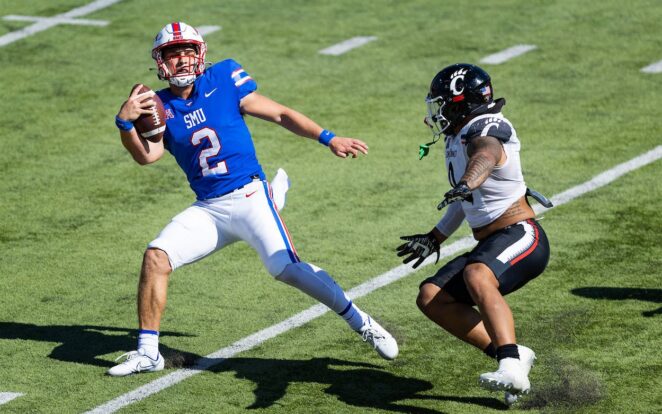Is it Worth Betting On The underdog In NCAA?
Watch a sports movie and it will almost inevitably be about an underdog team winning. Everyone loves the underdog, and everyone loves rooting for the underdog. But should you actually bet on the underdog when it comes to NCAA? The short answer is that you can bet on the underdog, but shouldn’t keep up hopes about seeing any payouts.
The long answer is that although the underdog does win surprisingly often, it still wouldn’t be very smart putting down an underdog bet. The fact of the matter is that betting on the favourite is still almost always the smart decision.
Who Decides Who The Underdog Is?

Let’s face it, NCAA sports leagues are complete chaos. Teams are mostly unrated, bettors are often just guessing, and sometimes, major upsets do occur. In all this mayhem, how does a sportsbook actually decide who the underdog is?
Sportsbooks don’t decide odds lightly. Experts at sportsbooks have spent years analysing data and investigating players. Yes, there is still a certain amount of flexibility going on, especially when it comes to NCAA leagues, but you can be sure that the underdog team has been given specific odds for a reason. The underdog is the underdog, you can be sure of that.
But odds don’t necessarily mean that the underdog will lose. That’s exactly what makes NCAA betting so interesting.
How Often Does The Underdog Win?

The question of how often the underdog wins is a complex one that depends on a variety of factors, including the sport, the level of competition, and the specific matchup. While there is no definitive answer, we can look at historical data to gain some insight into the phenomenon.
In general, the underdog is less likely to win than the favorite, as reflected in the odds offered by bookmakers. However, upsets do happen, and when they do, they can be very profitable for savvy bettors.
One factor that can influence the likelihood of an underdog win is the level of competition. In sports where there is a large talent gap between teams, such as professional soccer or basketball, the underdog is less likely to win than in sports where the competition is more evenly matched, such as college football or baseball.
Another factor to consider is the specific matchup. For example, a team that is heavily favored on paper may be vulnerable to an upset if they are playing in a hostile environment or have key players injured or suspended.
Ultimately, the decision to bet on the underdog depends on a variety of factors, including the odds offered, the specific matchup, and your own knowledge and analysis of the sport. While the underdog may be a riskier bet, it can also be more profitable if you are able to identify situations where the odds are mispriced or the underdog has a good chance of winning.
Point Spread Betting

Point spread betting, also known as handicap betting, is a popular form of sports betting that has gained widespread popularity in recent years. This type of betting is particularly popular in North America and is often associated with American football and basketball, but it is also common in other sports like rugby, hockey, and soccer.
The concept behind point spread betting is relatively simple. Bookmakers assign a handicap or point spread to a particular team, reflecting their perceived superiority or inferiority. The idea is to level the playing field, making it possible to bet on the underdog and still have a reasonable chance of winning.
For example, if the New York Giants are playing the Philadelphia Eagles, the bookmaker might assign a point spread of +6 to the Giants. This means that the Giants are six points ahead of the Eagles before the game even starts. If you place a bet on the Giants, you would win the bet if the team wins the game outright, or if they lose by less than six points.
Point spread betting allows for more even-handed betting, as it provides a way to bet on both the favorite and the underdog. It also encourages more betting activity as it provides opportunities for gamblers to bet on games they would otherwise avoid due to a lopsided matchup. Point spread betting is also popular with professional gamblers who use statistical models to identify value in the point spreads.
One of the advantages of point spread betting is that it can be more profitable than traditional betting, especially if you are knowledgeable about the sport you are betting on. By studying the teams and the odds, you can often find situations where the point spread is set too high or too low, giving you an opportunity to make a winning bet.
Should You Bet On The Underdog?

The bottom line is that underdog bets have long odds for a reason and it’s always a good idea to have a look at NCAA basketball picks before you make your decision. As the picks will likely show, betting on the underdog to win outright is, simply put, a long shot. On the other hand, point spread betting systems bridge the gap, make the underdog viable, and offer interesting betting opportunities.
Conclusion
In conclusion, betting on the underdog in NCAA can be a risky but potentially very profitable strategy for savvy sports bettors. While the underdog is less likely to win than the favorite, upsets do happen, and when they do, they can offer excellent returns on your investment. However, it is important to carefully consider the specific matchup, the odds offered, and your own knowledge and analysis of the sport before placing an underdog bet. Ultimately, betting on the underdog should be done with caution and discipline, and only with money that you can afford to lose.



